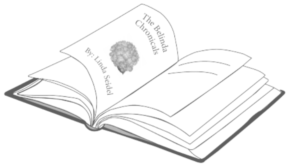
An enjoyable read that finds its strength in its honesty, ingenuity and familiarity, “The Belinda Chronicles” by Linda Seidel, a retired Truman State University English professor, is work that manages to turn tough topics into a light read without losing depth.
This “lightly fictionalized memoir” takes an unflinching look at the later stages of life, including losing one’s parents and confronting one’s own mortality.
“The Belinda Chronicles” is a steady read, taking a thematic approach that flirts with various timelines. The book alternates between vignettes about the people in Belinda’s life and her reflections as she struggles with the approaching deaths of her aging parents and enters a new stage of her life. It compares multiple generations of family members and asks about the ways our elders impact us, even as we become elders to those that come after us.
 Despite mainly focusing on life’s endings and the anxieties of old age, Seidel still manages to intersperse moments of lighthearted humor that bring a genuine smile to the reader’s lips by interspersing happy memories and staying true to her witty self. The narration is honest and inviting; many of the sections about Belinda reflecting on her own life feel as if the reader has been invited to sit down with her and listen to her story.
Despite mainly focusing on life’s endings and the anxieties of old age, Seidel still manages to intersperse moments of lighthearted humor that bring a genuine smile to the reader’s lips by interspersing happy memories and staying true to her witty self. The narration is honest and inviting; many of the sections about Belinda reflecting on her own life feel as if the reader has been invited to sit down with her and listen to her story.
If there is a weakness in the work, it would perhaps be the commentary on Belinda’s singleness. Seidel makes a clear case for why Belinda does not wish for marriage in her old age, but Belinda feels largely removed from social circles beyond her parents’ nursing home. It may have been nice to see Belinda find a new purpose in her life as she learns to live as the now-oldest generation of her family. However, considering the work is a memoir, that new purpose may not yet be ready to be written. The prologue sees Belinda setting out to learn in this new stage of her life and while she does learn over the course of the book, more lessons are undoubtedly to come.
While displaying a sharp mind, deep introspection, and clear writing ability, Seidel maintains an air of approachability that gives the reader the sense that they already know her. Belinda’s character sits at the intersection of the quintessential elderly woman and the free-spirited feminist. Her story is one of both family and individuality as she copes with what it means to “become a grown-up who made her own safety — and found her own fate.” She perfectly encapsulates the beginning of the end mentality that so many people face after retirement while still remaining relatable for readers of all ages. This book would be perfect for anyone beginning a new stage in their life because whether it is seventy years or twenty, everyone has a past that informs their future.
If you enjoyed “The Belinda Chronicles” and would like to read more, Seidel has continued to post new installments on Facebook and some of her vignettes are published in the digital magazine “Wordpeace,” where Truman professor and fellow Golden Antelope author, Monica Barron, is on staff.
